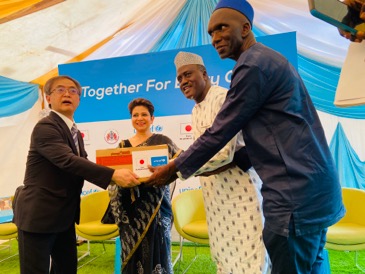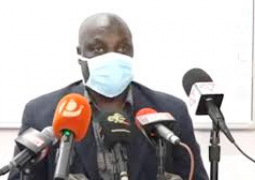
The lifesaving supplies include - 2,500 cartons of Ready-to-use therapeutic food; 1100 cartoons of F 75 milk and 100 cartoons of F 100 milk, will be delivered to health facilities across the country in a bid to augment Integrated Management of Acute Malnutrition.
According to officials, the supplies will support treatment of more than 2,500 under-five children with Severe Acute Malnutrition. Additionally, 1,000 cartoons of micro-nutrient powder to prevent anaemia on 10,000 under-five children, constitutes part of the consignment.
At the handing over ceremony, Mr. Shinichi Hirose, counsellor and Deputy Head of Mission at the Embassy of Japan to The Gambia, expressed delight for the partnership in drawing and implementing this important project, which he said, is directly relating to human security especially in these critical times of the rainy season and in view of how it impact the everyday life of many Gambians.
“The Government of Japan allocated seven-hundred and sixteen thousand and forty (716.040) US dollars to The Gambia, through UNICEF, to provide urgent support to Gambian population affected by floods, food insecurity and malnutrition in all the seven regions of The Gambia. This support consists of lifesaving nutrition supplies, safe water, sanitation and hygiene services to help improve resilience of vulnerable population especially children, girls and mothers.” he said.
“Japan is very sensitive to the diverse impact of Climate change on African countries."
That, he said, is the reason why Japan proposed two initiatives to address food shortage and health issues namely; ‘Africa Health and Wellbeing Initiative’ and the ‘Initiative for Food and Nutrition Security in Africa (IFNA)’ on the occasion of the TICAD7 Meeting held in Yokohama, in August, 2019.
Miss Nafisa Binte Shafique, UNICEF Country Representative, acknowledged that malnutrition poses serious consequences for children, affecting their health, cognitive development and productivity.
“In collaboration with the Ministry of Health and other partners in the health sector, we have witnessed improved results in the management of malnutrition among children under-five.”
“Between 2013 and 2019, the prevalence of stunting and wasting or underweight among under-five children decreased from 25% to 18% and 10% to 5% respectively. We can still do better with sustained commitment and resources. With strong partnership, we could galvanize national efforts and mobilize communities to ensure that every child grows up happy, healthy and strong.”
Additionally, she recalled that between 2016 and 2020, more than 21,000 under-five children were admitted and treated for Severe Acute Malnutrition and that more than 19,000 lives were saved through the Integrated Management of Acute Malnutrition programme.
Malang Fofana, Executive Director at National Nutrition Agency (NaNA), revealed that the country is truly experiencing the 'triple burden of malnutrition' vis under-nutrition (in the forms of stunting, wasting and underweight), over-nutrition (overweight and obesity, precursor for diet related NCDs) and micronutrient (in particular VAD, IDA & IDD) co-exist.
“This is due mainly to changes in diet, lifestyle and climate change, which is shaping the nutrition transition we are experiencing in the country. Majority of our diet today is based on highly processed food containing high amount of fat, sugar and salt.”
He added; “The population of children under 5 years in 2023 is estimated at 390, 655. Approximately, 20,000 of these children were wasted in 2023. With the current rate of severe wasting at 2.1%, it is estimated that over 8,000 of these children fall within the severely acute malnutrition category. Only about 50% were treated in 2023 indicating the need to strengthen advocacy for mobilizing more resources to increase coverage.”
To that end, Fofana thanked the Government of Japan for their technical and financial support over the years in implementing nutrition programmes and look forward to more support and collaboration in their quest to achieve greater success.



